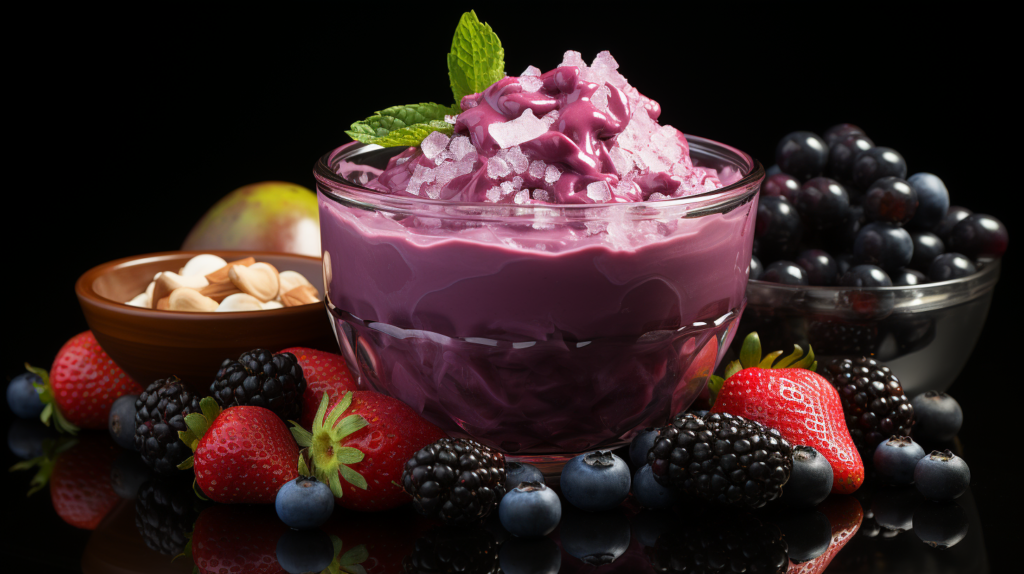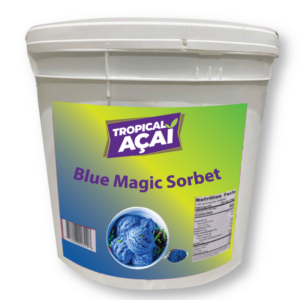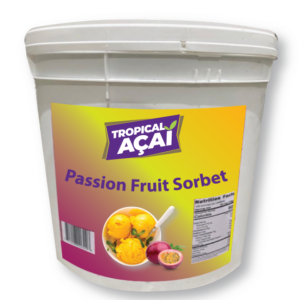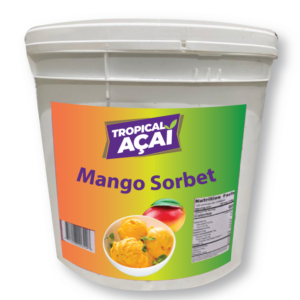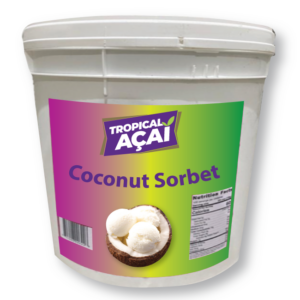Introduction: Unraveling the Mystique of Frozen Acai
A Glimpse into the World of Acai
Acai berries, dubbed the “Amazonian superfruit,” have taken the world by storm. But what’s the buzz all about? Originating from the Amazon rainforest, these dark purple berries are a potent source of nutrients. Besides their delightful taste, they have many health benefits, making them a popular choice for health enthusiasts. As global demand surged, the concept of frozen Acai gained traction. This format helps retain the fruit’s freshness and makes it accessible to consumers worldwide.
The Rise of Frozen Acai in Global Markets
Frozen Acai – the words resonate with health enthusiasts everywhere. Have you ever wondered why? It’s simple. Freezing Acai ensures this superfruit remains as fresh as the day it was picked. Whether you’re in New York, Tokyo, or Sydney, with frozen Acai, you’re essentially tasting the Amazon!
The Science Behind Acai: A Nutritional Powerhouse
Understanding the Natural Sugars in Acai
Nature is truly wondrous. Consider this: fruits come naturally sweetened. Acai is no exception. The natural sugars, primarily fructose, lend Acai its delightful sweetness. However, it’s crucial to distinguish between sugar sources. Acai’s sugars are naturally occurring, starkly contrasting the processed sugars in many commercial products. Furthermore, when you choose a product from a trusted frozen acai bulk supplier, you often get a product with minimal added sugars. So, each time you enjoy a serving of frozen Acai, relish nature’s sweetness gracing your palate!
Comparing Acai Sugar with Other Popular Fruits
How about a comparative analysis? Picture this lineup: apples, bananas, grapes, and our protagonist, Acai. In a sugar content showdown, where does Acai stand? Intriguingly, Acai often contains less sugar than many mainstream fruits. For context, grapes have roughly 16 grams of sugar per 100 grams, whereas acai averages around 2 grams. That’s quite the difference! Monitoring sugar intake is vital, but you’re decidedly on the more health-conscious side with Acai.
The Processes Behind Freezing and Sugar Retention
Diving deeper, how does the freezing process influence acai’s sugar levels? When Acai undergoes freezing, it’s all about preserving its natural nutrients, and the sugar content remains consistent. Top-tier frozen acai wholesale distributors prioritize the fruit’s authentic nature. The process is curated to ensure Acai’s inherent sugar remains intact, free from unnecessary additives. So, savoring Acai, whether in its homeland of Brazil or a quaint Parisian cafe, guarantees a consistent taste and nutritional experience.
The Glycemic Index of Acai: What Does it Mean?
Have you encountered the term Glycemic Index (GI)? It quantifies how swiftly foods elevate blood sugar. But why is this significant? High GI foods can trigger rapid blood sugar surges. Thankfully, Acai has a commendably low GI. This trait ensures that Acai releases sugar slowly into your bloodstream, providing steady energy. A low GI suggests improved blood sugar management, a boon for all, especially those with diabetes.
The Frozen Acai Market: A Dive into Supply Chains
From Forests to Freezers: The Journey of Acai
Deep within the heart of the Amazon rainforest, acai berries thrive, basking in the sun and absorbing the rich nutrients of the fertile soil. This untouched paradise is where our journey begins. Once harvested, these berries embark on a meticulous voyage. Immediate cleaning and quality checks ensure only the best berries are cut. Then comes the freezing process, a method perfected to retain the berry’s authentic flavor and nutritional value. Within hours, these berries are transformed into frozen Acai, ready to be shipped worldwide, bringing a piece of the Amazon to your table.
The Role of Frozen Acai Bulk Suppliers
In the grand tapestry of the acai market, frozen acai bulk suppliers are the unsung heroes. They bridge the gap between local harvesters in the Amazon and global consumers. Their role? It’s multifaceted. These suppliers are pivotal in ensuring consistent quality and establishing robust supply chains. They collaborate closely with local farmers, providing sustainable harvesting practices. Additionally, their stringent quality checks and state-of-the-art freezing facilities guarantee that what you get is the best.
Addressing the Demand: The Rise of Frozen Acai Wholesale
With the global health wave, the demand for frozen Acai has skyrocketed. And are they meeting this demand? Frozen acai wholesale distributors. Their expansive networks span continents, ensuring that Acai is within reach, whether in a bustling city or a serene countryside. They’ve revolutionized how we access this superfruit, making it a staple in households and eateries. By streamlining distribution and focusing on volume, they’ve also made Acai more affordable, ensuring more people reap its benefits.
Decoding the Labels: Sugar Content in Various Brands
Navigating the frozen acai aisle can be a tad overwhelming. With myriad brands and flashy labels, how do you make an informed choice? The key lies in decoding the labels. While most brands boast about being “all-natural,” it’s essential to scrutinize the sugar content. Some brands add sugars to enhance flavor, diminishing the fruit’s natural benefits. However, trusted brands, especially those sourced from top frozen acai bulk suppliers, prioritize purity. So, always be label-savvy, ensuring your acai bowl remains as nature intended.
Case Study: Tropical Acai – Setting the Gold Standard
Our Commitment to Quality and Purity
At the heart of Tropical Acai lies a singular vision: delivering the purest form of Acai to consumers worldwide. We understand that our patrons seek authenticity, and that’s precisely what we offer. From collaborating with local farmers in the Amazon to adopting advanced freezing technologies, every step echoes our unwavering commitment. We take pride in sourcing berries untouched by artificial additives or preservatives. Our mantra? Keep it pure, keep it Tropical.
How Tropical Acai Ensures Low Sugar Content
Sugar content has been the talk of the town, and rightfully so. At Tropical Acai, we’ve turned this concern into our strength. How, you ask? It’s a blend of nature’s bounty and our meticulous processes. We handpick berries that naturally have a lower sugar profile. Then, our freezing process is fine-tuned to retain this natural sugar content without adding additives. The result? Frozen Acai that’s as close to plucking it from the tree as possible. With Tropical Acai, you’re not just getting a product but experiencing a promise.
Real-life Feedback: What Customers Are Saying
Words on a page can only convey so much. So, let’s turn the mic over to our valued customers.
“Tropical Acai is a game-changer! It’s the closest I’ve come to tasting the Amazon.” – Maria, New York.
“As a nutritionist, I recommend Tropical Acai to my clients. The low sugar content and purity are unmatched.” – Gregory, London.
These testimonials are a testament to our dedication. The consistent feedback? Tropical Acai stands unparalleled in its commitment to quality.
Tropical Acai vs. Other Brands: A Comparative Analysis
How does Tropical Acai stand out in the sprawling landscape of acai brands? Let’s break it down:
- Sugar Content: While many brands dabble in added sugars to enhance taste, Tropical Acai prides itself on its natural sweetness.
- Sourcing: Our direct partnerships with Amazonian farmers ensure we get the freshest berries’ first pick.
- Sustainability: While others might prioritize profits, we focus on sustainable and ethical farming, ensuring the Amazon’s beauty is preserved for generations.
- Customer Feedback: The chorus of positive reviews sings one song – Tropical Acai is the gold standard.
While there are numerous players in the market, Tropical Acai’s commitment to quality, purity, and sustainability sets it apart.
The Sweet Concern: Is Frozen Acai High in Sugar?
Debunking Myths: Understanding Sugar in Acai
Myths abound in the realm of healthy foods. One such myth circling frozen Acai is its purported high sugar content. Let’s set the record straight. In its natural state, Acai contains sugars, but these are naturally occurring. The sugar content in Acai is primarily fructose, a raw sugar found in many fruits. However, the amount is considerably less compared to several other fruits. So, the notion that Acai is a sugar bomb? It’s time to bid it farewell.
The Health Implications of Acai’s Sugar Content
While we’ve established that Acai isn’t teeming with sugar, it’s essential to understand its health implications. Natural sugars, like those in Acai, are processed differently by our bodies compared to refined sugars. They provide a steady energy release, preventing those dreaded sugar highs and crashes. Moreover, Acai is packed with antioxidants, fibers, and healthy fats. So, the sugar content it does have is offset by its myriad health benefits. In a nutshell? Consuming Acai, especially from trusted brands like Tropical Acai, is more of a boon than a bane.
How Natural Sugars Differ from Added Sugars
Sugar isn’t just sugar. Sounds confusing? Let’s demystify. Natural sugars, like those in fruits, come bundled with fiber, vitamins, and other essential nutrients. This means they’re absorbed more slowly, providing sustained energy. Conversely, added sugars, often found in processed foods, lack these accompanying nutrients. The result? Rapid absorption leads to blood sugar spikes. It’s crucial to differentiate between the two, especially when scrutinizing product labels. You get the former with Acai, especially from reputable sources – a natural, wholesome sweetness.
Practical Tips to Consume Acai in a Healthy Way
Acai bowls and smoothies are all the rage. But how can you ensure you’re maximizing the health benefits? Here are some tips:
- Go Natural: Opt for frozen Acai without added sugars or preservatives.
- Mind the Toppings: While granola and honey are delicious, they can add extra sugars. Opt for nuts, seeds, and fresh fruits instead.
- Portion Control: Enjoying Acai is delightful, but moderation is key. Stick to recommended serving sizes.
- Stay Informed: Always read product labels, ensuring you know what you’re consuming.
Remember, it’s all about balance. With some mindfulness, Acai can be a delightful and nutritious addition to your diet.
A Global Perspective: How Different Cultures Use Acai
The Brazilian Love Affair with Acai
Brazil and Acai is a romance that has spanned centuries. Deep within the Amazon rainforest, locals have revered Acai as a food and an integral part of their culture. Traditionally consumed as a thick, creamy pulp, Acai often accompanies meals, offering a refreshing counterpoint to spicy dishes. Street vendors, or ‘barracks de acai,’ are shared across Brazilian towns, serving this delicacy with a granola sprinkle and honey drizzle. For Brazilians, Acai isn’t just a fruit; it reflects their rich heritage.
Acai Bowls: A Hawaiian Delight with a Twist
The sandy shores of Hawaii have embraced Acai with open arms. Enter the acai bowl – a dish synonymous with Hawaiian cafe culture. These bowls, brimming with frozen acai pulp, are adorned with many toppings, from fresh fruits to coconut shavings. The Hawaiian twist? Local ingredients like taro or macadamia nuts are often added, giving the classic acai bowl a unique island flavor. It’s a tropical dance of flavors where Brazilian tradition meets Hawaiian innovation.
Acai in European Cuisine: A Touch of Exoticism
With its diverse culinary landscape, Europe has found a special place for Acai. From Parisian patisseries to Roman trattorias, Acai has been incorporated in uniquely European ways. Think acai-infused gelatos or delicate acai-flavored macarons. European chefs, always looking for exotic ingredients, have embraced Acai for its vibrant color and distinct taste. The result? It is a fusion of European techniques with the bold flavors of the Amazon.
The Asian Fusion: Integrating Acai in Traditional Dishes
Asia, a continent known for its rich culinary tapestry, has enthusiastically welcomed Acai. Acai has been seamlessly integrated into traditional dishes in places like Japan and Korea. Picture this: sushi rolls with hints of Acai or acai-infused Korean bingsu. The natural sweetness of Acai complements Asian flavors, creating both familiar and novel dishes. It’s a testament to Acai’s versatility, proving that its charm knows no borders.
The Environmental Impact: Sustainable Sourcing of Acai
The Importance of Sustainable Harvesting
In an era where the environment is at the forefront of global discussions, how we source our food plays a monumental role. Sustainable harvesting isn’t just a buzzword; it’s a necessity, especially for fruits like acai, which come from the delicate ecosystem of the Amazon rainforest. Unsustainable practices can lead to deforestation, habitat loss, and a reduction in biodiversity. Sustainable harvesting ensures that we reap the benefits of acai without stripping the land of its natural resources. It’s about coexisting with nature, taking only what we need, and ensuring the forest thrives for generations.
Tropical Acai’s Pledge to the Environment
At Tropical Acai, our commitment goes beyond delivering high-quality acai. We’re deeply invested in the well-being of the Amazon rainforest. We promote and implement sustainable harvesting methods by collaborating closely with local farmers. Furthermore, a part of our proceeds goes towards rainforest conservation efforts. For us, every bowl of acai served is a step towards a greener, more sustainable future. When you choose Tropical Acai, you’re not just making a dietary choice; you’re making an environmental statement.
How Consumers Can Make a Difference
Every purchase is a vote. As consumers, we have the power to shape industries in our hands. We can drive a positive change by opting for brands that prioritize sustainability. Here’s how you can make a difference:
- Educate Yourself: Understand where your acai comes from and the practices behind its sourcing.
- Support Sustainable Brands: Choose brands, like Tropical Acai, that are transparent about their environmental initiatives.
- Spread the Word: Talk about sustainable practices and encourage friends and family to make environmentally conscious choices.
Together, each small choice can culminate in a significant impact.
The Role of Suppliers in Promoting Sustainability
Suppliers, especially significant players in the frozen acai wholesale market, are pivotal in shaping the industry’s environmental direction. Their decisions, from sourcing to distribution, influence the entire supply chain. By partnering with ethical farmers, adopting eco-friendly packaging, and minimizing waste, suppliers can set the gold standard for sustainability. Additionally, by educating consumers and being transparent about their practices, they can foster trust and promote a culture of conscious consumption.
FAQs: Addressing Common Queries
Why Does Frozen Acai Have Sugar Content?
Acai, like all fruits, contains natural sugars. These sugars, predominantly fructose, give acai its delightful taste. When acai is frozen, the sugar content remains, offering the same nutritional profile as fresh berries.
Can Diabetics Safely Consume Frozen Acai?
Absolutely! While moderation is vital, acai’s natural sugars are released gradually into the bloodstream, preventing sharp spikes. However, people with diabetes should always consult their healthcare provider before making dietary changes.
How Does Tropical Acai Ensure Product Purity?
Tropical Acai prides itself on its rigorous quality checks. From farm to freezer, each step ensures the acai retains its natural essence without additives, ensuring you receive nature’s best.
Are There Sugar-Free Acai Products in the Market?
While acai naturally contains sugar, some products might have reduced sugar. It’s essential to read labels and understand if the reduction is due to processing or added artificial sweeteners.
How is the Sugar in Acai Different from Processed Sugars?
Acai’s sugar is natural, with fibers and nutrients allowing slow absorption. Processed sugars, on the other hand, are refined and can cause rapid blood sugar spikes.
What is the Best Way to Store Frozen Acai?
Store frozen acai in your freezer, keeping it sealed to retain freshness. Once thawed, consume immediately and avoid refreezing.
How Can I Verify the Sugar Content in My Acai?
Always check the nutrition label on the product. Brands are required to list sugar content, giving you a clear idea of what you’re consuming.
Does Freezing Acai Change its Nutritional Value?
Not significantly. Freezing preserves acai’s nutritional profile, ensuring you receive the same benefits as the fresh fruit.
Why Choose Tropical Acai Over Other Brands?
Tropical Acai is committed to purity, sustainability, and quality. When you choose Tropical Acai, you opt for an authentic Amazonian experience.
Is Acai Suitable for a Low-Carb Diet?
Yes! While acai contains natural sugars, its carb content is moderate, making it suitable for most low-carb diets when consumed mindfully.
Conclusion: Making an Informed Choice with Acai
The Final Verdict: Is Frozen Acai High in Sugar?
While acai contains natural sugars, it’s far from a sugar-laden fruit. Frozen acai is a delightful addition to a balanced diet with its myriad health benefits and moderate sugar content.
Tropical Acai: Your Trusted Partner in Healthy Living
Choosing Tropical Acai means aligning with a brand that prioritizes your health, the environment, and quality. As you embark on your health journey, let Tropical Acai be your companion, offering the purest touch of the Amazon.

